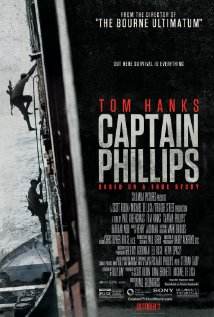
The acting is solid, the film never slows down or gets distracted by side plots. We all know the basics, if not the details of the story. And unless you were on the ship and wanted to be paid for your part of the story worrying about it being 100 percent accurate is silly too. What Hollywood "real life" film is 100 percent accurate?
But Captain Phillips is not the sort of film that is likely to stay with you after you see it either. As noted, the story is still fresh in the minds of many. There are few surprises here. Nor is there any attempt to get at deeper issues--Phillips family life, the conditions in Somalia that lead to such acts etc. It wise decision for the sake of this movie that these topics were only glanced on--any more would have risked dragging the movie down into the briny deep (as much as I am usually for more Catharine Keener screen-time)
We get just enough of Phillips at home to see he has a wife and kids. We get just enough of how and why the Somali pirates do what they do to make them more than just "bad guys." The audience knows they are put in the position they are, largely, by forces beyond their immediate control (ie the men who make the money on such crimes are not the ones racing through the seas on a skiff).
Of course this didn't stop one audience member, upon seeing the sentence one pirate received blurting out "I wonder how much WE are paying for that." Interesting sociological reaction and indicative of America today. Everything boils down into how much something costs. It would have been interesting to hear what this woman thinks should have been done to an apprehended and unarmed man. Some torture perhaps? And how much better are we as a people than they? Really? think about it.
But I digress.
Captain Phillips never gets into these issues and they have only a very peripheral place in this film. It is, however, very clear that the pirates are not operating out of ideology but for money. "No Al Queda." says the "captain" of the pirates--ably portrayed by Barkhad Abdi. Abdi mixes a sort of pathos with menace in his role. He brings a real tension, not necessarily because he is waving around a gun but because you see some sort of internal conflict in him as he makes his decisions, some sort of doubt.
In fact, one of the interesting parts of the movie is that there is no individualist hero. The "hero" here is procedure. Things do not go well for the crew of the Maersk Alabama in the movie but they certainly do not go as poorly as they might have. The film puts forward that the reason was that captain and crew stuck to the rule book. This is an unusual--and realistic--take on how to survive a crisis in a Hollywood film. Usually in Hollywood there has to be a hero--a highly paid bankable star with a machine gun. You need Brad Pitt to save you! In real life you need to keep your head and stick with what works (in most cases anyway).
This sense of the realistic animates this movie and while it isn't the most memorable film you will see this year? You will be entertained in the theater. Again, this puts it far ahead of the curve.


 RSS Feed
RSS Feed